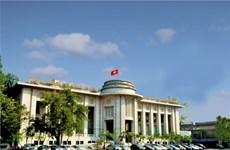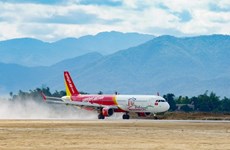HCM City enjoys export turnover rise
Ho Chi Minh City has maintained economic growth in the first seven
months of 2014, with increases in wholesale and service turnover, and
expansion of industrial production, heard a meeting to review the city’s
socio-economic development on July 24.
Ho Chi Minh City has maintained economic growth in the first seven
months of 2014, with increases in wholesale and service turnover, and
expansion of industrial production, heard a meeting to review the city’s
socio-economic development on July 24.
According to a report from the municipal People's Committee, in the first seven months, total wholesale turnover of the city reached 336.380 trillion VND (15.85 billion USD), a year-on-year increase of 12.8 percent.
Despite difficulties arising due to China's placement of the oil rig in the continental shelf of Vietnam in May, the city's export turnover rose to nearly 16.4 billion USD, up by 3.5 percent over last year.
Major export increases were in pepper (up by 85.5 percent); vegetables (48.5 percent); machinery, equipment and spare parts (37 percent); seafood (14.8 percent); coffee (14.6 percent); rice (11 percent) and garments (8.4 percent).
Meanwhile, the city's total imports went down by 8 percent over the same period last year, to 14.1 billion USD.
The city's industrial production increased by 6.2 percent over last year, with major increases (7.2 percent) in mechanics, chemicals, electronics, plastics and rubber.
Foreign direct investment (FDI) totalled 1.1 billion USD, a year-on-year increase of 80.2 percent.
In the same period, the city received nearly 2.4 million foreign visitors, up by 9.1 percent over 2013.
Total revenue of the city's tourism sector in the first seven months reached nearly 52 trillion VND (2.45 billion USD), an increase of 8.5 percent over last year.
Chairman of HCM City People's Committee Le Hoang Quan said despite difficulties and an increase in fuel prices, the city CPI (consumer price index) rose by only 0.12 percent, the lowest in the past few years, while the city's exports and industrial production were on the rise.
These increases indicate that the city's economy has developed well and has not been too dependent on overseas markets.
To score high growth and fulfill the targets of 2014, Quan asked the city's Government agencies to focus on measures to put prices and inflation under control, to stimulate consumption, and to work with other localities across the country.
Quan asked agencies to increase revenue from taxation but to ensure good business and production for enterprises in the city.
He told agencies to enhance taxation from land resources, saying this is one of the major sources of revenue for the city's infrastructure development.-VNA
According to a report from the municipal People's Committee, in the first seven months, total wholesale turnover of the city reached 336.380 trillion VND (15.85 billion USD), a year-on-year increase of 12.8 percent.
Despite difficulties arising due to China's placement of the oil rig in the continental shelf of Vietnam in May, the city's export turnover rose to nearly 16.4 billion USD, up by 3.5 percent over last year.
Major export increases were in pepper (up by 85.5 percent); vegetables (48.5 percent); machinery, equipment and spare parts (37 percent); seafood (14.8 percent); coffee (14.6 percent); rice (11 percent) and garments (8.4 percent).
Meanwhile, the city's total imports went down by 8 percent over the same period last year, to 14.1 billion USD.
The city's industrial production increased by 6.2 percent over last year, with major increases (7.2 percent) in mechanics, chemicals, electronics, plastics and rubber.
Foreign direct investment (FDI) totalled 1.1 billion USD, a year-on-year increase of 80.2 percent.
In the same period, the city received nearly 2.4 million foreign visitors, up by 9.1 percent over 2013.
Total revenue of the city's tourism sector in the first seven months reached nearly 52 trillion VND (2.45 billion USD), an increase of 8.5 percent over last year.
Chairman of HCM City People's Committee Le Hoang Quan said despite difficulties and an increase in fuel prices, the city CPI (consumer price index) rose by only 0.12 percent, the lowest in the past few years, while the city's exports and industrial production were on the rise.
These increases indicate that the city's economy has developed well and has not been too dependent on overseas markets.
To score high growth and fulfill the targets of 2014, Quan asked the city's Government agencies to focus on measures to put prices and inflation under control, to stimulate consumption, and to work with other localities across the country.
Quan asked agencies to increase revenue from taxation but to ensure good business and production for enterprises in the city.
He told agencies to enhance taxation from land resources, saying this is one of the major sources of revenue for the city's infrastructure development.-VNA













